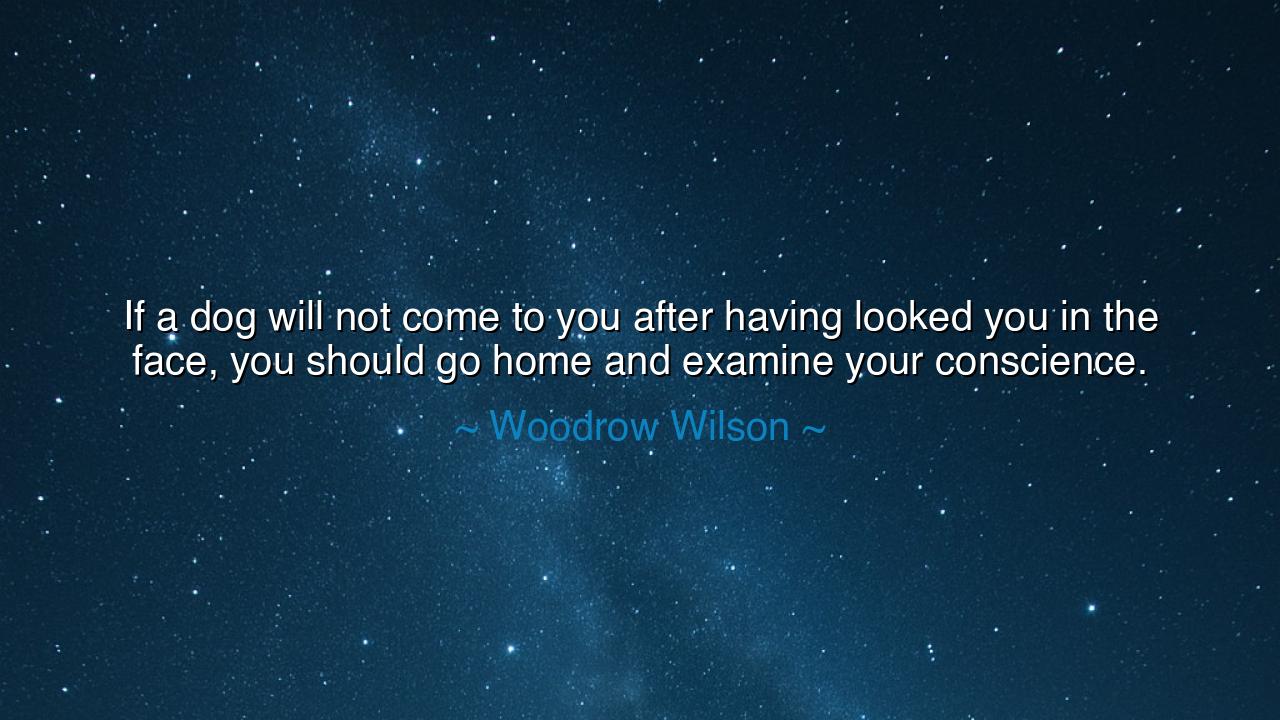
If a dog will not come to you after having looked you in the
If a dog will not come to you after having looked you in the face, you should go home and examine your conscience.






In the gentle yet piercing words of Woodrow Wilson, scholar, statesman, and visionary, there echoes a timeless truth about the nature of goodness and the purity of the heart: “If a dog will not come to you after having looked you in the face, you should go home and examine your conscience.” This saying, though simple in form, is profound in its wisdom. It speaks not only of our relationship with animals but of the moral fragrance—or stench—that emanates from the human soul. For in the eyes of a dog, that most loyal of creatures, truth is revealed without words.
Woodrow Wilson, the 28th President of the United States and a man known for both intellect and idealism, often reflected upon the inner life—the unseen realm of conscience and integrity. His quote may seem playful, yet it holds the gravity of a moral teaching fit for the ancients. The dog, to Wilson, stands as a living mirror of the human spirit—instinctive, uncorrupted, and incapable of hypocrisy. When such a creature recoils, it does not judge with reason but with intuition, sensing the dissonance that even other humans may overlook. Thus, Wilson urges: if even a creature of innocence finds something unsettling in your presence, it is not the dog that must change—it is you.
The ancients would have understood this well. In old Greece, the philosopher Diogenes roamed the streets with a lantern, seeking “an honest man.” He was called the Cynic—from the Greek kynikos, meaning “dog-like.” To him, the dog represented purity, honesty, and the natural virtue that civilized men had forgotten. The dog did not flatter, did not deceive, did not bow to false gods of wealth or status. Its loyalty was given to truth alone. So too, Wilson’s words draw from this ancient symbolism: that a dog’s trust is not easily bought, for it is a measure of the soul, not of the hand that feeds.
There is a story told of Abraham Lincoln, who during the Civil War found a stray dog wandering near his camp. The animal, frightened and hungry, would not approach any of the soldiers, but when Lincoln knelt and softly called to it, the dog came forward and placed its head in his lap. “You see,” Lincoln said, “he knows he can trust me.” That trust was not born of position or command—it was born of gentleness, of the invisible light that emanates from a kind heart. Like Wilson, Lincoln knew that the eyes of the innocent perceive truth more clearly than the wise.
The dog’s refusal in Wilson’s quote becomes, then, a metaphor for all creation’s response to the moral state of humanity. Nature itself recoils from deceit and cruelty, just as it draws near to compassion. The world, like the dog, can sense the heart’s temperature. A man who radiates peace finds peace even among beasts; a man whose spirit is corrupted finds no comfort even in the faithful gaze of his own companions. To examine one’s conscience is to look inward with courage—to ask whether one’s presence in the world brings warmth or coldness, trust or fear.
In this way, Wilson’s words are not merely about dogs—they are about character. They remind us that morality is not measured by law, by wealth, or by eloquence, but by the quiet test of sincerity. The truest test of a person’s virtue is not how they treat equals, but how they treat those who can offer nothing in return—animals, servants, strangers, the unseen and the unheard. A good conscience, like sunlight, invites all to draw near. A guilty one casts shadows that even a loyal hound will not cross.
Therefore, let this be your lesson: tend to your inner life, for the world reflects what lies within you. If kindness departs from your heart, the earth will grow colder around you. If compassion burns bright within you, all creatures—human and otherwise—will recognize it and draw near. Do not wait for the world to change its face toward you; first, change the countenance of your soul.
For in the end, the dog is but a messenger of truth—a silent prophet reminding us that goodness cannot be feigned. Let your conscience be clear, your heart gentle, your words sincere, and your spirit humble. Then, not only will dogs come to you with wagging tails, but so too will the trust of others, the respect of the wise, and the peace of your own soul.






AAdministratorAdministrator
Welcome, honored guests. Please leave a comment, we will respond soon